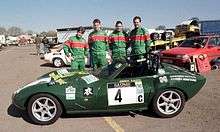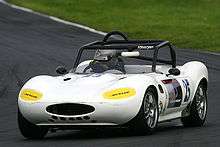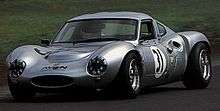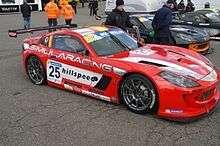Ginetta Cars
 | |
| Industry | Automotive |
|---|---|
| Founded | 1958 |
| Founder | Walklett brothers |
| Headquarters | Leeds, West Yorkshire, United Kingdom |
Key people |
Lawrence Tomlinson, Chairman Simon Finnis, Managing Director |
| Products | Sports cars |
| Parent | LNT Group |
| Website | Ginetta.com |
Ginetta Cars is a British specialist builder of racing and sports cars based in Garforth, Leeds, West Yorkshire.
History





20th century
Ginetta was founded in 1958 by the four Walklett brothers (Bob, Ivor, Trevers and Douglas) in Woodbridge, Suffolk. Their first product sold as the Fairlight was a glass fibre body shell priced at £49 for fitting to Ford 8 or 10hp chassis.[1] The first car, not destined for production, which subsequently became known as the Ginetta G1, was based on a pre war Wolseley Hornet six.[2]
From their original base, the company moved to Witham, Essex in 1962, and between 1972 and 1974 operated from larger premises in Ballingdon Street adjacent to the railway bridge Sudbury, Suffolk before returning to Witham where they remained until 1989. Under the Walkletts, Trevers was mainly responsible for styling, Ivor for engineering, Douglas for management, and Bob for sales.
Following the retirement of the Walkletts in 1989 the company was sold but failed, and was then bought by an international group of enthusiasts, based in Sheffield, and run by managing director Martin Phaff producing the G20 and G33
21st century
In late 2005 Ginetta was acquired by LNT Automotive, a company run by experienced racing driver and successful businessman Lawrence Tomlinson. His aims remained in line with the original founders of Ginetta; to continue producing innovative, capable and above all, great value sports cars.
In mid-2007 Ginetta moved to a state-of-the-art factory near Leeds, with a target to sell 200 cars a year. Trained engineer Tomlinson himself penned the base specification for the Ginetta G50, which was produced to celebrate 50 years of Ginetta production, and became a successful GT4 and award winning car.
In March 2010, Ginetta acquired the Somerset-based sports car manufacturer Farbio, and re-badged their car the Ginetta F400. In March 2011, Ginetta launched the G55, running in the Michelin Ginetta GT Supercup and built to the GT3 class regulations. In October 2011 Ginetta launched the G60, a two-door mid-engined sports car developed from the F400 and powered by a Ford-sourced 3.7-litre V6 engine.[3]
Currently, Ginetta have developed a range of award-winning road and race cars, making them a formidable player on the world motorsport scene.
Models
The first car, the G2, was produced as a kit for enthusiasts and consisted of a tubular frame chassis to take Ford components and aluminium body. About 100 were made. The G3 was introduced with glass fibre body in 1959 to be followed by the G4 in 1961.[4]
The G4 used the new Ford 105E engine and had a glass fibre GT style body and the suspension was updated to coil springing at the front with Ford live axle at the rear. Whereas the G2 and G3 had been designed for competition the G4 was usable as an everyday car but still was very competitive in motor sport with numerous successes. Over 500 were made up to 1969 with a variety of Ford engines. In 1963 a coupé was introduced alongside the open car and a BMC axle replaced the Ford one at the rear.[5] On test the car reached 120 mph (190 km/h) with a 1500 cc engine.[6] The series III version of 1966 added the then-popular pop-up headlights. Production stopped in 1968 but was revived in 1981 with the Series IV which was two inches wider and three inches (76 mm) longer than the III.
The G10 and G11 from 1964 were higher-powered versions with 4.7-litre Ford V8 and MGB engines respectively. The G12 was a mid-engined competition car.
In 1967 the G15 was launched utilizing a rear mounted 875cc Sunbeam Imp engine.[7] This two-seater coupé had a glass fibre body bolted to a tube chassis and used Imp rear and Triumph front suspension. Approximately 800 were produced from 1967 to 1974 [7] and the car was fully type approved allowing for the first time complete Ginetta cars to be sold. Eight G15s were engineered for Volkswagen engines and called the "Super S".
In 1970 it was joined by the larger G21, which was initially available with either a 1599 cc Ford Kent engine, or a 3-litre Ford V6 engine.[8] The 1725 cc Sunbeam Rapier engine subsequently became the standard four-cylinder engine for the car. The model was later updated to become the closed G24 or open top G23. The G19 was a Formula 3 single seater but only one was ever made.
Following reorganisation the company moved to Scunthorpe and started making cars in kit form again in the 1980s starting with the G27 and followed by the G26, G28, G30 and G31, with all cars using Ford parts. It was also decided to re-enter the complete car business with the mid-engined G32 with a choice of 1.6- and 1.9-litre 4-cylinder engines available as a coupé or convertible and the G33 convertible with 3.9-litre Rover V8 capable of 145 mph (233 km/h) and a 0-60 mph time of 5 seconds. The G4 was re-introduced in 1981 as the G4 Series IV, with a new chassis.[9] It was produced through to 1984 with approximately 35 examples built.[9] In 1990 the G32 coupé cost £13,700, the convertible £14,600, and the G33 £17,800.
After Ginetta was acquired by Lawrence Tomlinson in 2005, the company began work on the design of the Ginetta G50 - a 3.5 litre V6 engine, producing 300 BHP - to celebrate the company's 50th birthday. In 2007, the car competed in its first race in the European GT4 Cup in Nogaro France, finishing second.
Soon after this success, the machine was officially launched at Autosport International in early 2008 alongside its sister car, the Ginetta G50 GT4. Together, they have become Ginetta’s biggest selling machine, and have raced (and won) in almost every continent, including the Dubai 24 Hour endurance race in 2012 with Optimum Motorsport.
In March 2010, Lawrence acquired the Somerset-based sports car manufacturer Farbio, and in doing so inherited the F400, which was subsequently redesigned, redeveloped and rebranded from the Farbio Marque, into a Ginetta G60; a two-door mid-engined powerhouse which shares the same 3.7 litre V6 engine as its G55 GT3 stablemate and packs a real punch, capable of 0 – 60 mph in 4.9 seconds, with a top speed of 165 mph.
In the same year, Lawrence implemented a newer, safer car into the existing Ginetta Junior series and in doing so, replaced the old Ginetta G20 race car with a G40J. In concordance with his belief in nurturing young racing talent through the motorsport ladder, today’s G40J is designed for young racing drivers, offering an entry-level 1800cc, 100 bhp racing car with such safety features as a full integral FIA approved roll cage and fibre-glass shell.
Following the success of the G40J, Ginetta decided to introduce a Ginetta G40 Challenge car for the adult racers in its Challenge series. With the same engine as its sister car, the G40 Challenge car is capable of 165 bhp and competes against existing G20 models. Today, the car features heavily in the Total Quartz Ginetta GT5 Challenge, one of the most popular competitive racing series in Britain.
With strong demand for a G40 race car, Ginetta unveiled its second road car - the Ginetta G40R - in 2011, designed to mimic the Walklett brothers' original vision of 'a race car for the road'. Capable of 0-60 in 5.8 seconds, the G40R shares a number of characteristics with its racing siblings.
2011 also saw the introduction of the G55 Cup car to the Ginetta GT Supercup, which, until that point, had only featured the G50 Cup car. Offering a 3.7 litre V6 engine with 380 BHP, the car provided Ginetta with the basis for their Ginetta G55 GT3 Car; a larger spec machine which gives GT teams a 4.35L V8 powerplant, complete with an aggressive-looking body which masks an efficient aerodynamic package.
Ginetta Racing Championships
Ginetta Chairman Lawrence Tomlinson’s vision for Ginetta is to provide competitive and affordable motorsport for drivers as young as 14 to be able to progress through the Ginetta championships comprehensive career ladder, before ultimately competing in top level GT or single-seater arenas.
No other British manufacturer runs three championships within the two biggest racing packages in Britain and receives the levels of media exposure gained throughout the season. The Michelin Ginetta GT4 SuperCup and Ginetta Junior Championship can be seen running alongside the British Touring Car Championship, whilst the Protyre Motorsport Ginetta GT5 Challenge is a firm favourite on the British GT package.
Over the past five years, Ginetta have supported over 240 drivers as they took their first steps into the world of motor racing, and have established routes from entry-level racing to the 24 Hours of Le Mans, helped most recently by the introduction of the Ginetta Racing Drivers Club.
Michelin Ginetta GT4 SuperCup
The Michelin Ginetta GT4 SuperCup is a single-class race series which features both the Ginetta G50 and G55 sports cars; running in support of the British Touring Car Championship.
The championship began as the Ginetta G50 Cup in 2008, supporting the British Formula Three Championship and British GT Championship. In 2009 it moved to support the BTCC. In 2011, with the introduction of the Ginetta G55, the championship became the Michelin Ginetta GT4 SuperCup.
The 2014 season will be the fourth running of the Michelin Ginetta GT4 Supercup, but it will be the first year in which the G50 GT4 and G55 GT4 cars are consolidated into one single class. In order to maintain fair competition, the two models will be equalised through a balance of performance test.
Ginetta Junior Championship
As the only company in the world which offers junior drivers a genuine route into top-level racing, this value-for-money championship uses the G40 Junior car, and gives aspiring racing drivers aged between 14 and 17 the chance to take their first step up the motor racing ladder, whilst focussing on driver potential rather than racing budget.
A support race to the British Touring Car Championship since 2008, the Ginetta Junior Championship has proven to be a very popular addition to the package and has evolved into a well-regarded Junior car racing championship in the UK.

Ginetta Junior Scholarship
The Ginetta Junior Scholarship is designed to assist youngsters in making the transition into sports car racing with a fully funded season in the Ginetta Junior Championship on offer for the winner. Launched in 2009, the scholarship is awarded to a single driver who excels as judged by Ginetta.
Having boosted the motorsport careers of Louise Richardson, Sennan Fielding, Oliver Basey-Fisher and Jamie Chadwick, the 2014 Ginetta Junior Scholar, Alex Sedgwick beat 60 other drivers to secure a fully funded season in the 2014 Ginetta Junior Championship, in support of the British Touring Car Championship.
Protyre Motorsport Ginetta GT5 Challenge
The Protyre Motorsport Ginetta GT5 Challenge offers a unique, low-cost opportunity to race in a single-make racing championship, over seven race weekends supporting the British GT package. For 2014, the series will once again return to Spa for an international round alongside the Swedish Ginetta Challenge series.
A popular entry-level championship for many GT racers, the series boasts packed grids with close racing. All weekends are triple headers, providing 21 races throughout the season, with all races counting towards the final championship positions.
Ginetta Racing Drivers Club
Created exclusively for newcomers to the sport, the Ginetta Racing Drivers Club is aimed at aspiring racers, offering step-by-step support as they move from the UK roads to a variety of well-established GT circuits. Membership entails the ownership of a new, Ginetta G40 Club Car and includes one-on-one driver tuition, ARDS racing licence package, a four round racing championship and a number of corporate events.
See also
References
- ↑ Car Mechanics magazine advert. 1959.
- ↑ Georgano, N. (2000). Beaulieu Encyclopedia of the Automobile. London: HMSO. ISBN 1-57958-293-1.
- ↑ "Ginetta G60 (2011) CAR review". Car Magazine. 21 October 2011. Retrieved 21 October 2011.
- ↑ For road test see Motor Sport, September 1962, Pages 690, 693.
- ↑ Motor Sport, May 1963, Pages 345-346.
- ↑ Motor Sport, April 1964, Pages 260-261.
- 1 2 Michael Sedgwick & Mark Gillies, A-Z of Cars 1945-1970, page 82
- ↑ "Motor Show Number: Car by Car Guide and Ginetta advertisement". Motor. nbr 3565: Pages 21 & 175. 17 October 1970.
- 1 2 Peter Higston, The Enthusiasts' Guide to Buying a Classic British Sports Car, 2007, page 60
Bibliography
- Walklett, Bob (1994). Ginetta - The Inside Story: 31 Years of British Specialist Car Manufacturer. Bookmarque Publishing. ISBN 1-870519-28-0.
- Rose, John (1988). Ginetta: The Illustrated History. G T Foulis & Co Ltd. ISBN 0-85429-685-9.
- Pyman, T (2004). History of the Ginetta G4. Bookmarque Publishing. ISBN 1-870519-69-8.
External links
| Wikimedia Commons has media related to Ginetta vehicles. |
